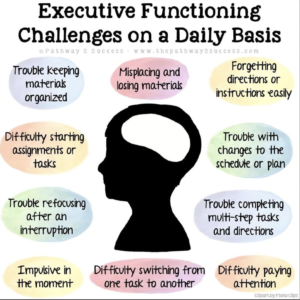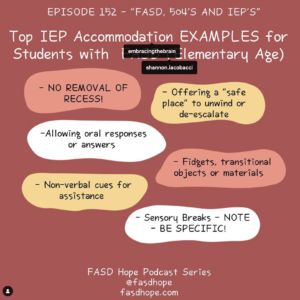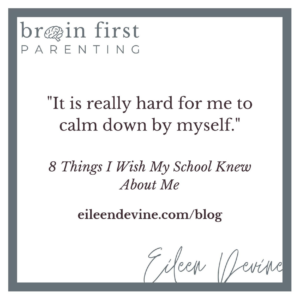Within your child’s IEP or 504 plan, there will be a section listing very specific educational, behavioral, academic, and sensory strategies for your child. These are called accommodations, modifications, services, and specially designed instructions. Read on so you have a good understanding of which of these particular accommodations may best serve your student. Feel free to borrow and use any of the following list of strategies!
 Executive Functioning
Executive Functioning
- Break everything down into simple steps
- Give extra time for processing
- Use a Visual Schedule
- Allow extra time for transitions
- Preview any changes or unusual events
- Be concrete with your language
- Limit the number of steps or requests made
- Preferential seating
- Timer for time management
- Provide and teach how to use a Planner
Sensory
- Sensory breaks/movement opportunities built in throughout the day
- Doodle during class
- Fidgets/seat cushions/rubberband on bottom of chair
- Water bottle/gum in class
- Noise-cancelling headphones
- Weighted vest or lapad
- Adaptive Gym class/activities
 Social
Social
- Building peer supports and relationships via formal or informal social skills group
- Peer modeling
- Use of scripts for interactions
- Pair student with the same peer to encourage appropriate communication
- Classroom education and sensitivity training about student’s disability
 Classic Academics
Classic Academics
- More time for test taking and homework
- Teacher notes/outlines given to student ahead of time
- Hear instructions read aloud
- Modify assignments and tests
- Scribe to take notes
- Responding orally or through video
- Typing instead of writing
- Use of digital tools across all areas such as spellchecker, iPad, etc.
- Use calculator or table for math facts
- Get graded or assessed using a different standard than other students
- Quiet room for test taking
Behavior
- Create safe space to go to to calm down
- Never remove recess
- Identifying and reducing/preventing triggers
- Transition prompts
- Increasing predictability
- Providing opportunities to assist others
- Leadership opportunities within the classroom
- Give student jobs
- Preview all changes
- Classroom expectations posted
- Choices, choices, choices





